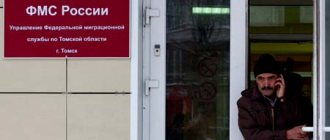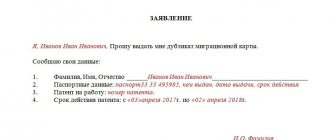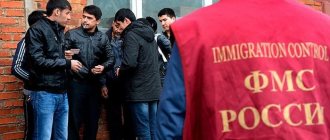The migration situation remains tense around the world. Illegal migrants are willing to spend tens of thousands of dollars and risk their lives just to get to more prosperous countries. States, on the contrary, are looking for more and more effective tools to combat illegal migration and illegal immigrants. One such tool is readmission. Today we will look in detail at what this migration instrument is, to whom and in what order it is applied, and answer many other questions.
general information
External unwanted migration is an interstate problem. The countries of origin daily flood the external borders of the Russian Federation and other countries with thousands of illegal immigrants seeking a better life. Therefore, the problems of illegal migration can only be solved through the joint efforts of interested states. One of the tools for solving such problems is readmission.
Readmission is one of the options for deporting illegal immigrants. In this case, the obligation to accept them rests with the state from whose territory they illegally arrived in the country of expulsion.
If we consider readmission from the point of view of the receiving party, then this is the agreement of the state to accept an illegal immigrant back into its territory, from which he illegally entered the territory of the expelling country. In simple words, readmission is the right of one state to expel an illegal immigrant to the territory of the border country of his illegal entry, which is obliged, in turn, to accept him.
When applying readmission, the citizenship of an illegal immigrant does not always matter. As a rule, it can only be sent to the country from which it arrived - accordingly, the receiving party must accept it regardless of nationality. Since this cannot be accomplished without the interaction of states, the legal regulation of this process is carried out in accordance with international treaties. The signing of such agreements is a priority in the migration policy of many countries, including Russia, the EU, and the USA.
In parallel, the concept, process and content of readmission are regulated by domestic legislation. This, in particular, is the subject of Chapter 5.1 of the Federal Law of July 25, 2002, Federal Law No. 115 “On the Legal Status of Foreigners in the Russian Federation” (hereinafter referred to as Federal Law No. 115). In particular, it describes in detail the expulsion procedure, other procedures applied within its framework, the possibilities of suspension and termination and other features. But more about them later.
It is important to understand that, from a legal point of view, readmission is not a measure of responsibility for illegal stay in the country. This qualitatively distinguishes it from deportation or, for example, expulsion.
Differences between readmission and deportation and expulsion
At first glance, administrative expulsion, deportation and readmission seem to be concepts of the same order. But this is not true, and here's why:
- Expulsion is a measure of administrative liability, usually prescribed by a court, can be appealed and involves a ban on further entry. Readmission is carried out out of court and does not involve appeal.
- Deportation applies to persons who had, but have lost, legal grounds for staying in the country. Readmission assumes that the foreign citizen initially had no grounds for legal stay.
- Deportation and expulsion are categories of the exclusive competence of national legislation, in contrast to readmission, the decision on which is made at the interstate level.
- Another difference between deportation and readmission is the receiving party. In the first procedure, deportation is carried out to the country of citizenship. As a rule, readmission can only be made to the place where the person came from, although exceptions are possible.
What is readmission
Readmission is considered a procedure for returning a person subject to deportation from his place of residence to his final location if he is not a full citizen . The main point of the process is to ensure that the interests of the country with the person are protected and the process of ensuring the privileges of those who are subject to forced removal.
Readmission, different from other methods of expulsion from the state, is a mutual process between two parties. This is a kind of agreement between countries, which certainly includes clauses on the movement of a migrant. For example, the Russian Federation has created such documentary agreements with thirty countries of the former USSR and European Union states.
According to the laws of the Russian Federation, the following people are subject to readmission:
- carrying out illegal labor activities;
- illegally entered the country;
- using false documents;
- staying on the territory of the state after their visa has expired.
Important! Detainees have the right to legal, medical, appeal assistance and temporary asylum. In addition, the detention, deliberate removal to shelter and deportation of minors is impossible without their parents and guardians. Detained minors may be expelled if adequate protection of the receiving party is guaranteed.
Reasons and grounds for using readmission
The introduction of readmission and its spread as an instrument of interstate migration policy is due to a number of reasons:
- The initial prerequisite for the emergence of such an institution was the desire of states to organize the process of identifying and forcibly returning illegal immigrants to their countries of permanent residence in such a way as to ensure respect for fundamental human rights. Interstate regulation is a guarantee of their compliance;
- later, as the situation with migration in the world worsened, it became a tool for implementing national migration legislation and directly protecting the borders of civilized countries. It has become most widespread among European countries, which currently suffer the most from illegal migration;
- in parallel, readmission can be seen as a tool for forcing the state to more strictly control its borders. For example, an agreement on a simplified transit procedure to the Kaliningrad region was reached between Lithuania and Russia only after the conclusion of a readmission agreement.
As for the grounds for using this instrument, they are usually stipulated by the terms of a bilateral or international agreement. The wording in different documents may differ, but the essence is usually the same: persons who do not or no longer comply with the rules for entry from the country, conditions of temporary stay or residence established by the legislation of the country of their entry/stay/residence are subject to readmission.
To which countries is forced return acceptable?
International law allows for the forced return of migrants only to those countries with which the expelling party has an appropriate agreement. Without it, the readmission process is impossible even theoretically, and it is believed that a migrant can only be readmitted to the country from which he came to Russia. And this is only partly correct. The fact is that the possibility of a foreigner returning to a particular country is stipulated by the content of the interstate agreement.
An analysis of the agreements signed by the Russian Federation allows us to conclude that forced return from the Russian Federation is carried out to the country:
- from which the foreigner entered Russia, having at the time of entry a valid visa of this state;
- from which the foreigner entered Russia illegally, regardless of whether he has permits to stay/reside in this country at the time of entry;
- in which a foreigner has a residence permit or other permit for permanent residence or citizenship, even if he came to Russia not from this country.
Thus, the country from which the migrant arrived illegally is only one of the options to which Russian border services can return the foreigner. The final choice of the destination country is theirs and depends on the specific situation. At the same time, the presence of documentary evidence of the possibility of deportation to a specific country is mandatory. But the existence of an interstate agreement with a specific state remains the main condition for readmission.
Below you can read about deportation and how it differs from deportation (extradition, etc.):
Deportation (expulsion, expulsion) is the forced expulsion of a person or an entire category of persons to another state or another locality, usually under escort.
Readmission is the consent of the state to accept back into its territory its citizens (as well as, in some cases, foreigners who were previously present or resided in this state) who are subject to deportation from another state.
This is interesting: Deportation of Kyrgyz from Russia 2021
Extradition (extradition) is a form of international cooperation between states in the fight against crime. Consists of the arrest and transfer by one state to another (at the request of the latter) of persons suspected or accused of committing a crime (for trial), or of persons already convicted by the judicial authorities of that other state (for execution of the sentence).
Expulsion is the administrative or judicial removal of persons from their places of residence or from a certain territory with a ban on entry into them without the permission of the authorities.
Expulsion differs from deportation because, despite certain similarities, these concepts are different.
Thus, deportation is applied in cases of loss or termination of a foreigner’s legal grounds for further stay (residence) in the Russian Federation.
That is, deportation means that a migration service employee or employer gives a foreigner a ticket “home”, and, if necessary, accompanies him to a vehicle traveling abroad.
However, deportation itself does not lead to any legal consequences. An exception may be a foreigner’s refusal to leave, in which case he may be held administratively liable for violating the stay regime.
If a person has been deported, then in the future he may return to Russia on new grounds.
But administrative expulsion, in addition to punishment, solves the problem of preventing administrative offenses.
Thus, a foreigner subject to expulsion, in addition to being expelled from the territory of the Russian Federation, is restricted from entering Russia for a period of 5 years (1 year in the case of expulsion by officials of the Border Service of the FSB of Russia).
In the case of crossing the Russian border by foreigners who were previously expelled from the territory of the Russian Federation on documents with changed data, when identified by border control authorities, these citizens are not allowed into the territory of Russia and, through the competent authorities, their entry is restricted according to new data for the period of deportation.
In each case of illegal change of data, the inquiry authorities of the border service consider the issue of initiating a criminal case under Article 322 of the Criminal Code of the Russian Federation “Illegal border crossing”. If a criminal case has been initiated against you, you can also contact a criminal lawyer - Oleg Nikolaevich Filippov.
Interstate agreements on readmission
Interstate agreements on readmission signed by Russia are the only basis on which the forced return of a foreigner in this manner is permissible. In parallel, they are the only source of interstate legal regulation of relationships in this area.
Such agreements establish:
- mutual obligations of countries to each other within the framework of readmission;
- the procedure for providing evidence of the existence of grounds for forced return, in particular the procedure for submitting documents;
- the procedure and deadlines for filing relevant petitions, the deadlines for providing a decision on them, including under the simplified procedure;
- the procedure for rejecting applications;
- conditions of transfer and types of transport, the procedure and procedure for transit, the procedure for bearing the costs of readmission, the procedure for resolving interstate disputes, and so on.
In order to most fully resolve issues related to the implementation of signed agreements, countries also sign an executive protocol to the readmission agreement.
Such a protocol usually contains:
- a list of bodies and services from each country competent to consider readmission issues;
- a complete list of documents proving the existence of grounds for the citizen’s return;
- the need and procedure for conducting an interview with a foreigner;
- list of data in the request for the return of a foreigner;
- accompanying persons, readmission procedure, language, procedure for bearing expenses and other issues.
We remind you once again that these agreements and protocols to them are the main source of legal regulation of relations regarding the forced return of citizens. And it is they who can establish certain features.
Countries with which agreements have been signed
The list of countries with which the Russian Federation has concluded relevant bilateral or multilateral readmission agreements is presented in the table below.
| Powers and scope of activity | Distributor | Dealer |
| The essence of the work | Distribution and promotion of a brand or one of its directions in the country (from the word distributor). This includes searching and forming a network of dealers, marketing activities and advertising campaigns | Work with the end consumer. Most often, goods are supplied to the dealer by a general or exclusive distributor. |
| Exclusivity | It can become the only representative of a foreign company in the Russian Federation or regional; it is also possible to exclusively supply a certain line of goods. | The dealer cannot claim this right, since most often his ability to cover the domestic market is not so great. |
| Opportunity to work with several foreign manufacturers | If a distribution agreement presupposes the impossibility of cooperation with other suppliers, then such representation is called general representation. Such a prohibition is negotiated individually | The choice - to cooperate with one company or present several brands to customers at once - remains with the dealer |
| Warranty and maintenance | In addition to events to promote goods and create a network of dealers, service and repair centers are often organized. One of the conditions is the use of technologies, materials and spare parts from the manufacturer | Organize service independently or through centers organized by the distributor |
| Price policy | In most cases it is strictly regulated in the contract with the supplier | May be free. Especially if the product is purchased without delays or promotions. |
Please note that each of these agreements has its own characteristics. For example, the Readmission Agreement between Russia and the EU assumes that the relevant executive protocols are adopted by the Russian Federation not with the Union itself, but with each EU country separately. Such protocols were in particular signed between Russia and Sweden, the Netherlands, Malta, Austria, Finland, the Slovak Republic, France, Belgium, Poland and other countries.
There are other striking examples. In particular, the international agreement on readmission between Kazakhstan and Russia, according to which the countries agree to the mutual forced return of not only persons who entered the territory of the signatory countries illegally or have the right to reside/stay in them, but also citizens of these countries. For example, if a citizen of Kazakhstan came to Russia for naturalization from a country with which the Russian Federation does not have an agreement, and the grounds for his stay were canceled, the Russian Federation may request his return to Kazakhstan.
In some cases, the ability to implement an agreement is determined by the relationship between countries. For example, a new agreement between the Russian Federation and Ukraine has been in force since 2021, however, due to the current situation in the region and relations between states, the implementation of the agreements reached is extremely difficult.
Why countries don't want to sign readmission agreements
Signing readmission agreements is a priority only for developed countries that seek to eliminate or at least minimize illegal migration flows. Other countries, on the contrary, seek to avoid such signing; as a rule, these are countries of origin of illegal immigrants. For example, despite lengthy negotiations, at the time of preparation of publication, an agreement with Tajikistan has not yet been signed. This is due to the massive migration flows between countries, since the majority of those deported from the Russian Federation are Tajiks.
The second important point is transit. Countries through which large migration flows pass on the way to more prosperous countries refuse to accept such migrants into their territory. However, refusal to accept them may be provided for by agreement.
How the agreement is concluded
The procedure can only be carried out if there is an agreement concluded between the countries. As a rule, countries enter into such an agreement with their neighbors - the main “suppliers” of illegal migrants.
The Russian Federation has concluded such agreements with the following countries:
- Ukraine;
- Kyrgyzstan;
- Switzerland;
- Armenia;
- Turkish Republic;
- Norway;
- Lithuania;
- Uzbekistan;
- Iceland;
- Vietnam;
- Denmark.
The agreement contains the basic conditions and mechanisms according to which the deportation procedure is carried out. Among them:
- categories of persons who may be subject to readmission and exceptions;
- rules for determining citizenship;
- rules for determining entry into the territory of the Russian Federation;
- conditions of transit and movement of citizens, place of their transfer;
- ways to protect personal data;
- financial security issues.
The agreement also defines special conditions for people with disabilities, children and other socially vulnerable groups. It sets out the rights and obligations of the receiving and expelling parties.
This is interesting: Deportation of Belarusians from Russia 2021
Readmission procedure
As has already been said, the specific procedure for implementing the procedure for readmission of a foreign citizen and stateless person from the territory of the Russian Federation is regulated not only by international treaties, but also by domestic legislation.
So, in accordance with Art. 32.2 Federal Law No. 115, the procedure includes the following steps and actions:
- Identification of a person subject to readmission. Such powers are vested only in the Main Directorate for Migration Affairs of the Ministry of Internal Affairs (formerly the Federal Migration Service) and its local territorial bodies.
- Making a decision on the forced return of a foreigner. In accordance with the order dated 17.02. 2021 Ministry of Internal Affairs No. 75, such a decision is made only by the Minister of the Ministry of Internal Affairs, his deputies, the head of the Main Directorate of Internal Affairs of the Ministry of Internal Affairs and his deputies, the Minister of the Ministry of Internal Affairs of a constituent entity of the Federation and his deputies, as well as the head of the Department of Internal Affairs of the Administration of the Ministry of Internal Affairs in the subject and his deputies.
- Submitting an application for readmission to a foreign state and receiving a response on it.
- If necessary, placement of a foreign citizen in a specialized institution, where he can stay without a court decision only for 8 hours, if more - only by court decision.
- Coordination of the issue of transfer of a foreigner with border authorities.
- If necessary, agree on the transit of an immigrant through the territory of a third country.
- Direct transfer across the border to the destination and reception of the person by border guards of the second party.
The law allows both regular and accelerated return procedures, but this must be provided for by an international treaty. This makes it possible to reduce the time for consideration of an application, as a rule, from the usual 30 days to 2. According to clause 1.1 of Art. 32.2 of Federal Law No. 115, an accelerated procedure is applied in cases where a person is detained by border guards in the border area.
Features of readmission of children
Russian legislation regarding minors and a number of international legal acts (in particular, the Convention on the Rights of the Child) define some features of the forced return procedure for children:
- the readmission procedure for minors cannot provide for their detention in a specialized institution without accompaniment - they can only be placed there with legal representatives;
- a child may be transferred unaccompanied to another country only to his parents or other legal representatives;
- When making decisions, the legal status of minor migrants is taken into account, which often does not allow their readmission. And if it is impossible to return the child, the expulsion of his parents is also unacceptable - only the whole family must be expelled together.
Postponement or termination of the procedure
In accordance with Art. 32.4 Federal Law No. 115, the readmission procedure may be delayed if:
- the migrant subject to deportation has a disease that, if deported, would pose a threat to the life and health of others;
- the migrant subject to deportation has a seriously ill close relative in the Russian Federation, including in the event of his death;
- the migrant has applied for refugee status;
- the migrant is involved in a pre-trial investigation or trial or has been sentenced to imprisonment;
- an emergency situation, natural disaster or other force majeure circumstances occurred.
In turn, termination of the procedure is possible only in the event of the death of a migrant, his recognition as dead or missing, his granting of humanitarian status, or his voluntary departure.










